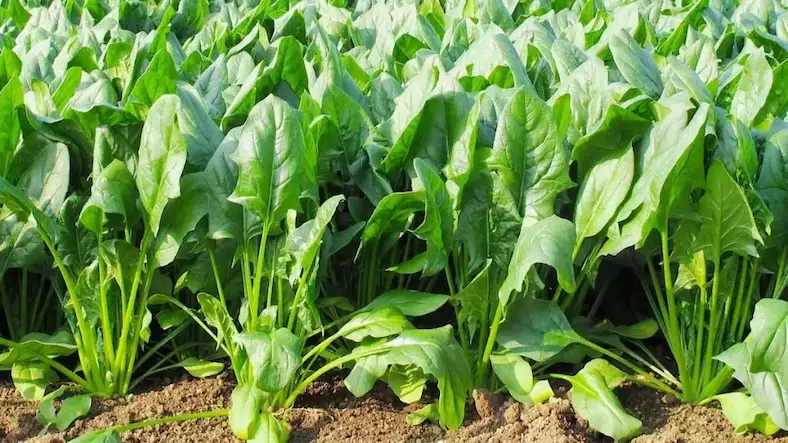Spinach is a nutrient-rich leafy green vegetable that offers a wide range of health benefits. It's a versatile and nutritious addition to various dishes and can be consumed cooked or raw.
Here’s the nutritional composition of spinach per 100 grams of raw spinach:
- Calories: 23 kcal
- Carbohydrates: 3.6 g
- Dietary Fiber: 2.2 g
- Sugars: 0.4 g
- Protein: 2.9 g
- Fat: 0.4 g
- Saturated Fat: 0.1 g
- Monounsaturated Fat: 0.01 g
- Polyunsaturated Fat: 0.2 g
- Vitamins and Minerals:
- Vitamin A: 9377 IU (187% DV)
- Vitamin K: 482.9 mcg (403% DV)
- Vitamin C: 28.1 mg (47% DV)
- Folate (Vitamin B9): 194 mcg (49% DV)
- Iron: 2.7 mg (15% DV)
- Calcium: 99 mg (10% DV)
- Magnesium: 79 mg (20% DV)
- Potassium: 558 mg (12% DV)
Please note that these values are approximate and can vary based on factors such as the specific variety of spinach and how it is prepared. Cooking spinach can lead to a reduction in volume due to water loss, which can concentrate some nutrients.
Here are some of the key benefits of spinach:
Rich in Nutrients:
- Spinach is packed with essential vitamins and minerals. It's an excellent source of vitamin K, vitamin A, vitamin C, folate, iron and manganese. These nutrients play vital roles in bone health, immune function and energy metabolism.
Antioxidant Properties:
- Spinach contains various antioxidants like vitamin C, vitamin E, beta-carotene and lutein. These antioxidants help protect cells from damage caused by free radicals, which are unstable molecules linked to chronic diseases and aging.
Heart Health:
- The nitrates present in spinach may contribute to lower blood pressure levels. Additionally, the high potassium content in spinach can help counteract the effects of sodium, aiding in maintaining healthy blood pressure.
Bone Health:
- Spinach is an excellent source of vitamin K, which plays a crucial role in bone health by helping with calcium regulation and bone mineralization. Adequate vitamin K intake is associated with a reduced risk of fractures.
Digestive Health:
- Spinach contains dietary fiber that supports healthy digestion. Fiber helps prevent constipation and promotes regular bowel movements. It also supports a healthy gut microbiome.
Cognitive Function:
- Spinach contains compounds like folate and vitamin K that are associated with improved cognitive function and a reduced risk of cognitive decline.
Vision Health:
- Lutein and zeaxanthin, two antioxidants found in spinach, are associated with promoting eye health. They are believed to help protect the eyes from age-related macular degeneration and other vision issues.
Weight Management:
- Spinach is low in calories and carbohydrates, making it a great choice for those looking to manage their weight. Its high water and fiber content can help promote feelings of fullness.
Cancer Prevention:
- The antioxidants and phytonutrients in spinach, including flavonoids and carotenoids, have been studied for their potential to reduce the risk of certain types of cancers.
Skin Health:
- The vitamins and antioxidants in spinach, such as vitamin A and vitamin C, contribute to healthy skin by supporting collagen production and protecting against damage from UV rays and environmental factors.
Blood Sugar Regulation:
- The fiber and antioxidants in spinach may contribute to better blood sugar control, making it a valuable food for individuals with diabetes.
Here are the popular recipes that feature spinach:
- Spinach Salad
- Spinach Juice
- Spinach curry
- Palakura Pappu, Palakura Vepudu, Palakura Pulusu and Palakura Fry
- Palak Paneer, Palak Chana
- Spinach and Feta Stuffed Chicken
It's important to note that while spinach offers numerous health benefits, a balanced and varied diet is key to overall well-being. Incorporating spinach into your diet along with other nutrient-rich foods can contribute to a healthier lifestyle.
Thanks for reading the article, for more food related articles read our peoples blog articles.















